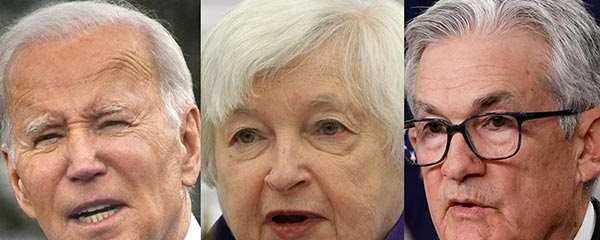Story Highlights
- Kuwait, India, Singapore have highest confidence in financial sector
- Country, individual income not the only factors in financial confidence
- Confidence in government related to confidence in banks
WASHINGTON, D.C. -- With the spotlight trained on the health of the world’s financial sector, global surveys in 2022 showed the public’s trust in financial institutions varies widely around the globe, ranging from a low of 4% in Lebanon to a high of 95% in Kuwait.
The International Monetary Fund Spring Meetings in early April shed light on the challenges facing the global economy. IMF Managing Director Kristalina Georgieva emphasized the slow pace of projected growth over the next five years and the "dangerous divergence" between the prospects of developing and emerging-market economies.
However, the size of a country’s economy does not always predict public confidence, as countries with big economies -- like Italy, Spain and Greece -- rank in the bottom 10 in overall confidence. Emerging and developing economies such as India, Bangladesh, Indonesia, Vietnam and Tanzania all appear in the top 10 list, highlighting the variation in factors beyond national income and economic output in shaping public perceptions.
Confidence in financial institutions is a key indicator of trust in the stability and reliability of the financial system. This trust is crucial for financial institutions to attract deposits, investments and other forms of funding, which in turn support economic growth and development. Measuring public confidence in the banking sector is essential for policymakers and financial institutions to identify improvement areas and promote transparency, accountability and financial literacy.
The public’s trust in the financial sector is influenced by a complex interplay of various economic, political and cultural factors. Notably, income levels -- at the country or individual level -- alone do not determine public confidence, and even high-income countries can experience significant disruptions in the financial sector. The collapse of Silicon Valley Bank and Credit Suisse, the largest bank failures since the 2008 financial crisis, serves as a stark reminder of this reality around the world.
High Confidence Exists in Mix of High- and Low-Income Economies
Kuwait, India and Singapore are among the top countries where nearly all residents express high confidence in their financial institutions. While the World Bank classifies Kuwait and Singapore as high-income economies, India is an emerging economy and a lower-middle-income country. Several other lower-middle-income countries -- such as Bangladesh, Indonesia, Vietnam and Tanzania -- also appear in the top 10 list.
While a country’s economic classification doesn’t always align with public confidence in the banking sector, countries with well-developed regulatory and legal systems tend to have more stable and trustworthy financial institutions.
Singapore, for instance, is known for its stringent regulatory environment, which has contributed to its reputation as a safe and stable financial hub. Kuwait and India have also implemented strong regulations and have made efforts to improve transparency and accountability in their financial systems.
Lebanon Leads the World With the Least Confidence in Banks
On the other hand, residents of Lebanon almost universally lack faith in their banks; 94% reported in 2022 that they do not have confidence. The country was downgraded to lower-middle-income from upper-middle-income last year.
The 4% of Lebanese adults who have confidence in their financial institutions is the lowest on record since ║┌┴¤═° began asking this question in 2006. Lebanon has been dealing with a protracted economic crisis since October 2019, which was exacerbated by the COVID-19 pandemic. The World Bank has noted Lebanon’s crisis as one of the largest and longest economic crises in its modern history.
Rounding out the bottom 10 list are several countries with high-income economies, such as Italy, Spain and Greece. These European countries have low levels of confidence in their financial institutions. During the 2009-2014 European debt crisis, they were part of a group of countries among the hardest hit in the eurozone, with high levels of public debt, fiscal deficits and unemployment.
However, differences in the financial systems within the bottom 10 countries highlight the multifaceted determinants of public trust in the financial sector.
Confidence in Financial Institutions Is Related to Confidence in Government
Globally, Lebanese adults have the lowest confidence in their national government (10%) as well as their banks (4%). On the other end, Singapore (91% and 90%, respectively) and India (84% and 90%) both have high confidence in their national government and financial institutions. These two variables are related.
Financial institutions rely on national governments for regulatory and stability measures. Governments may aid institutions or implement regulations during economic crises to avoid future ones. This relationship can also influence public trust in financial institutions. Understanding this connection provides valuable insights into public confidence in financial institutions.
While some countries exhibit a nearly 1-to-1 ratio between confidence in government and in financial institutions, others show a different trend. The U.S. is an outlier, with residents expressing lower confidence in their government than in financial institutions.
The U.S., a high-income country, ranks in the middle in terms of financial confidence, at 56%. Additionally, 31% of Americans are confident in their government, indicating there may be a lack of trust in the country's regulatory and stability measures.
These lower confidence levels may be attributed to a variety of factors, including recent economic crises, political polarization and increasing inequality. ║┌┴¤═° recently released findings showing Americans’ level of concern about the safety of their money in banks is similar to where it stood in 2008 during the financial crisis.
Bottom Line
High levels of confidence in financial institutions in countries such as India and Singapore illustrate how effective policies and regulations can build public trust. Additionally, these countries with high trust in government as well as in banks may be better insulated against the contagion of a future global banking crisis.
Governments can play a crucial role in building economic trust by regulating financial institutions and ensuring their stability. During times of crisis, they may provide financial assistance to struggling institutions or implement regulations to prevent future ones. The relationship between financial institutions and national governments can also affect public perceptions of financial institutions.
The collapse of Silicon Valley Bank and Credit Suisse in 2023 serves as a reminder that disruptions in the financial sector can happen anywhere and that efforts must be made to promote transparency, accountability and financial literacy to increase public confidence in financial institutions worldwide. It is essential for governments to instill the public’s trust and maintain that trust through effective policies, regulations and economic stability measures.
To stay up to date with the latest ║┌┴¤═° ║┌┴¤═° insights and updates, .
For complete methodology and specific survey dates, please review .
Learn more about how the works.




